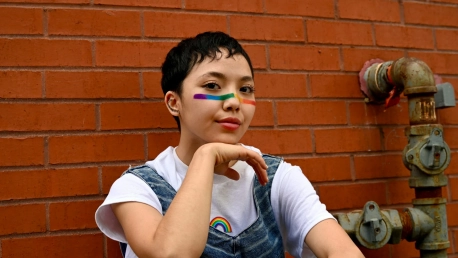In Indonesia, climate change is exacerbating the struggles of a particularly at-risk group: transgender women. Already marginalized and boxed out of the formal economy, many rely on jobs exposed to the elements. The changing climate—with longer rainy seasons and more severe storms—poses an increasing threat to their precarious livelihoods, intensifying their vulnerability. As weather patterns grow more unpredictable, these women find themselves disadvantaged, directly facing the harsh impacts of environmental change. This struggle highlights a broader issue of social justice, where the consequences of a warming planet are not borne equally, often hitting marginalized communities the hardest. Addressing the needs and safety of Indonesia’s transgender women in the context of climate change is not only an environmental imperative but also a crucial aspect of human rights.
The Economic Impact of Climate Change on Trans Women
Facing the Elements Daily
In Indonesia, transgender women frequently earn their living through public endeavors like street performing or small-scale vending. However, erratic weather severely impacts their ability to make ends meet. Picture a transgender woman roadside, her income reliant on the generosity of those passing by; an unexpected rainstorm not only dampens her morale but may also erase her daily profits. Such weather events are increasingly common, indicative of a broader climate crisis that injects harsh unpredictability into their already precarious financial situation. To make matters worse, the transgender community faces deep-seated societal prejudice, adding layers of challenge to their existence. These women are in a constant battle with the elements and societal bias, both posing threats to their stability and well-being.
Limited Adaptation Strategies
Trans women, facing rapid climate change, must adapt within a society often hostile to their existence. In areas where disasters are misattributed to moral failings, transgender people can unfairly become targets, blamed for environmental issues. This stigmatization can hinder their access to necessary resources for climate resilience. Government measures aimed at helping vulnerable groups such as women, the elderly, and those with disabilities frequently overlook the specific adversities faced by gender and sexual minorities. This oversight leads to a lack of targeted aid and policies for trans individuals, leaving them unassisted in the pursuit of hope and security against the consequences of a changing climate. The absence of inclusive policymaking exacerbates the risks for trans women, who must navigate a path of resilience with little support from official channels.
Community Resilience and Empowerment
Grassroots Responses to Environmental Pressures
In the face of adversity, transgender women are rallying together. Community-led groups like Sanggar Seroja are creating havens of support. They organize vibrant fashion shows amid the rain and host cozy movie nights to combat the chill, fostering solidarity and courage. Through heartfelt discussions, they tackle the stark impacts of climate change on their daily lives. Data from these grassroots organizations reveal stark realities—many members are suffering from reduced incomes and higher living expenses, direct fallout from extreme weather events. Yet, the tenacity of these women is evident in their activities, embodying a community’s determination to overcome the challenges posed by nature’s fury. This defiance and unity tell a tale of endurance; these women are firm in their resolve not to let storms erase their presence and collective spirit. Their initiatives embody defiance against the elements, a testament to their unyielding resilience.
Innovating for Survival
In Indonesia, trans women like Joya Patiha are carving out new paths amid climate challenges. Traditional street trades are unreliable due to weather extremes, so they’re turning to businesses such as cake making. Support from NGOs, for instance, Yayasan Srikandi Pasundan, is pivotal, offering training in business skills. This shift toward entrepreneurship is an innovative approach to mitigating the economic impacts of climate unpredictability. These women are building sustainable livelihoods that offer stability despite environmental uncertainties.As climate change accentuates hardship, the struggles of trans women reflect the need for inclusive and nuanced responses to environmental and social issues. Recognizing the differential impacts of climate change is crucial. We must craft solutions that safeguard the most vulnerable and acknowledge the complex challenges they face, creating a more resilient society for all.









